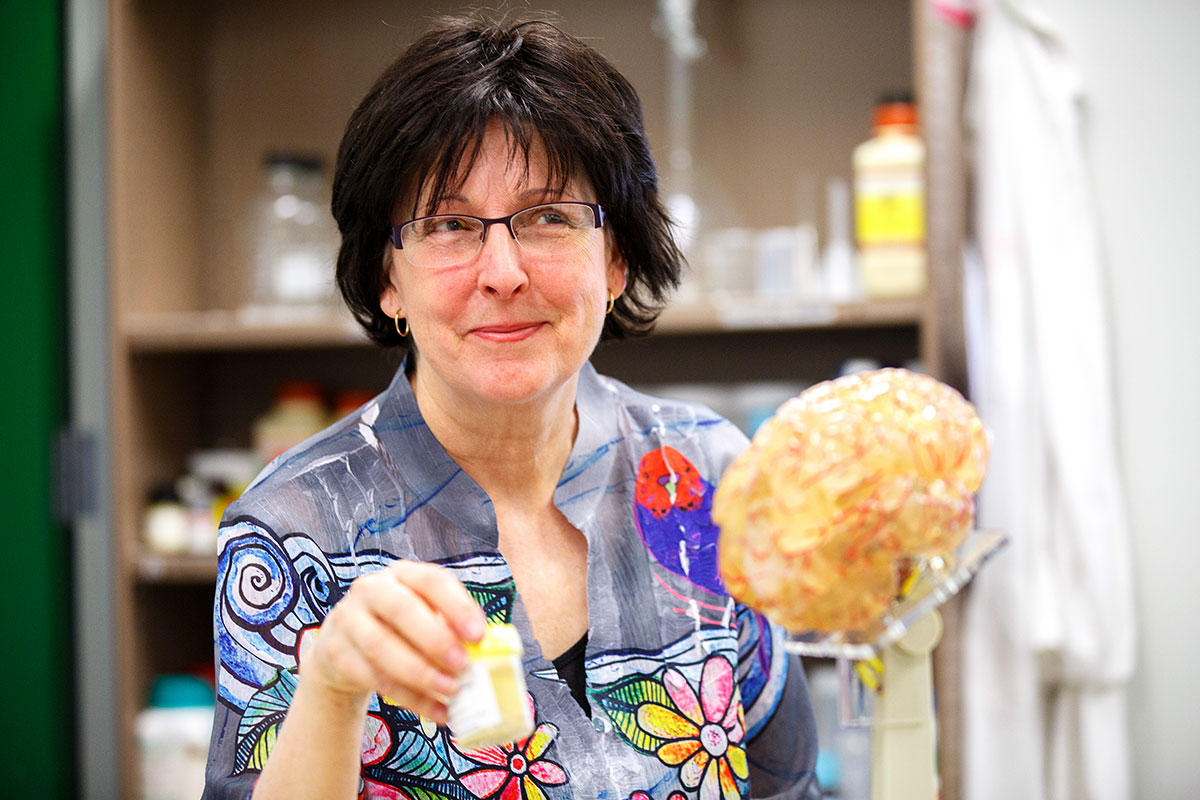
Robyn Flook, the long-running coordinator of the South Australian Brain Bank, has passed away after a long battle with cancer.
Ms Flook joined the Flinders University School of Medicine’s Centre for Neuroscience in 1989. Over the years she was responsible for building the collection of human nervous system tissue held at the SA Brain Bank to support research.
Associate Professor Mark Slee, the Associate Dean of Medical Science and Technology at the School of Medicine, says Ms Flook developed and curated one of the largest brain banks in Australia.
“Her expertise has been sought nationally and internationally and she established a strong track record in science communication and administration,” Associate Professor Slee says.
“She contributed selflessly to many aspects of School of Medicine life, and in particular in relation to her role as manager of the South Australian Brain Bank and raising the public awareness of the need for neuroscience research.
“Beyond her role as manager of the Brain Bank, Robyn will be most remembered for her enduring optimism even in the face of an incurable disease, her irreverent sense of humour, compassion and empathy,” Associate Professor Slee says.
The Flinders Centre for Neuroscience made her a life member in 2015.
As well as raising public awareness, Ms Flook willingly shared her expertise in the technical aspects of neurological tissue preparation and the legal, governance and ethical dimensions of tissue banking with her peers and neuroscience researchers around the world.
“Hundreds of thousands of Australians are living with neurological and psychiatric diseases, and the more donor tissue we have to study, the better the chances are that we can beat these diseases in future,” she says in The Investigator Transformed Flinders 50th Anniversary publication.
More than 340 brains and 20 spinal cords have been donated to the collections.
After more than 25 years at Flinders, her tireless contribution was summed up in 2015 when she received the Unsung Hero of South Australian Science Award during National Science Week.
The matter-of-fact researcher told The Advertiser at the time what it was like to live with cancer and a resulting neurological disease.
“I’ve been a researcher all my life almost, or 26 years, so to see from the other side — as a patient — what it feels like and what you go through, it’s quite interesting,” she said.
Robyn also managed of the SA Neurological Tumour Bank, co-located with the SA Brain Bank at the Flinders Medical Centre.
“These donor tissue banked over the past 30 years are still giving new insights into the diseases and disease process and will be of benefit well into the future,” Ms Flook said after receiving the 2015 award.
“The latest in technology, proteomics, genomics, genetics, molecular and new research can be applied to the tissue stored in the brain bank.
“This can give new insights into neurodegenerative processes such as Parkinson’s, Alzheimer’s, dementia and other conditions which pose a big problem to our health systems as our populations age.”
SA Neurological Tumour Bank co-ordinator Dr Rebecca Ormsby, a research associate at the Flinders Centre for Innovation in Cancer, paid tribute to Ms Flook’s dedication and commitment.
“She was one of the most energetic, dynamic and positive people I have ever met,” Dr Ormsby says. “She was utterly devoted to the Brain Bank prior to her illness … and continued to work as long as she could even while undergoing chemotherapy and radiotherapy.”
The South Australian Brain Bank was founded in 1986 by Flinders Professor William Blessing and University of Adelaide Professor Peter Blumbergs to support research into neurological diseases. In 1993, South Australia joined with the other states to form the Australian Brain Bank Network.
The collections rely on public support including donations via the Flinders Foundation Christmas Appeal.
In lieu of flowers for Robyn’s funeral (19 April), her family has asked for donations to support the SA Brain Bank and Neurological Tumour Bank at the link here – or by phoning the Flinders Foundation on (08) 8204 5216.

